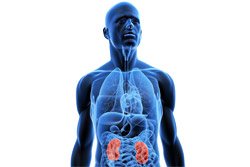Most early rehospitalization after kidney transplant caused by complexity of the condition, not poor quality of care

A study of over 750 kidney transplant patients over a five-year period conducted by researchers at the Perelman School of Medicine at the University of Pennsylvania has found that 90% of early rehospitalizations (within 30 days of surgery) were caused by complex medical factors related to the transplantation process. Only nine percent of rehospitalizations – which occurred among only three percent of the entire group of patients – were categorised as potentially preventable.
The study, published online this week in the American Journal of Transplantation, found that 237 patients (nearly one-third) were rehospitalized early following surgery, with a median of nine days to rehospitalization after discharge from kidney transplant. In most of these cases, the readmissions were unplanned and occurred as a result of common postsurgical complications. Deep vein thrombosis (blood clots), post-operative pain, organ rejection, fluid imbalances including volume overload (too much fluid in the blood) or volume depletion (decrease in volume of blood plasma, potentially leading to shock), and wound infections were key complicating factors leading to early rehospitalisation.
“Nationally, high rates of early rehospitalization after kidney transplantation have been reported, but little information is available about what caused these events and whether they could be prevented,” said lead study author Meera Nair Harhay, MD, MSCE, instructor of Medicine in the Renal, Electrolyte and Hypertension Division at Penn. “Early rehospitalization has also been examined by Medicare as a hospital quality of care indicator, with financial penalties for early rehospitalization after certain medical conditions. However, our findings indicate that transplant recipients are a particularly vulnerable group that often requires additional care after undergoing surgery and being exposed to new medications.”
In the study, which is the first to use intensive chart review to assess preventability of early rehospitalization, two physicians independently examined the medical charts of the 237 readmitted transplant patients. Only 19 cases were found to be preventable readmissions by the reviewing physicians. Preventable causes of readmission identified by the study include 1) patients not having had an outpatient physician/nurse practitioner assessment before being admitted, 2) an alternative medical regimen not having been prescribed at discharge, 3) patients not having been compliant with their medication regimen, and 4) inadequate outpatient diagnostic or therapeutic procedures having been available.
The study also found that 30% of rehospitalized patients were originally discharged after their transplant on the weekend, versus 23% of patients who were not readmitted –a statistically significant finding highlighting the need for careful transitions of care when staffing is variable and more limited, such as occurs on the weekends. “If further multicenter studies confirm these findings, transplant centers should consider augmenting staffing and the oversight related to weekend discharges,” said senior author Peter Reese MD, MSCE, assistant professor of Medicine and Epidemiology at Penn.
The study also revealed how long waiting times for transplantation increase the risk of post-transplant complications. For every year of additional waiting time prior to kidney transplantation, recipients were 10% more likely to experience early rehospitalization. Kidney transplant recipients who were rehospitalized within 30 days of transplant were 55% more likely to die within a six-year follow-up period than those who were not rehospitalized. “These findings indicate that early rehospitalization may be a strong signal of patient vulnerability, and such patients may benefit from more careful clinical monitoring post-transplant,” said Harhay.
(Source: University of Pennsylvania, American Journal of Transplantation)
“You Have the Power to Donate Life – Sign-up today! Tell Your Loved Ones of Your Decision”
No comments:
Post a Comment